Financial Reporting: IASB Framework, Concepts, and Statements
VerifiedAdded on 2020/10/23
|7
|1703
|247
Report
AI Summary
This report provides a comprehensive overview of financial reporting, emphasizing the framework established by the International Accounting Standards Board (IASB) and its significance. It delves into the objectives of financial reporting, which include providing crucial information on a company's financial position and performance to aid decision-making by stakeholders such as creditors, investors, and management. The report outlines the core concepts of financial reporting, including recognition, financial statement presentation, and measurement, while also discussing the importance of elements like assets, liabilities, income, and expenses. Furthermore, it explores key accounting concepts such as the money measurement concept, full disclosure, economic entity, and the going concern concept, highlighting their role in preparing accurate and reliable financial statements. The report underscores the relevance of financial reporting assumptions, like relevance, faithful presentation, and enhancing quality, which ensure the usefulness and credibility of financial data. Ultimately, the report concludes by stressing the importance of financial statements and accounting concepts in effective business management and decision-making.
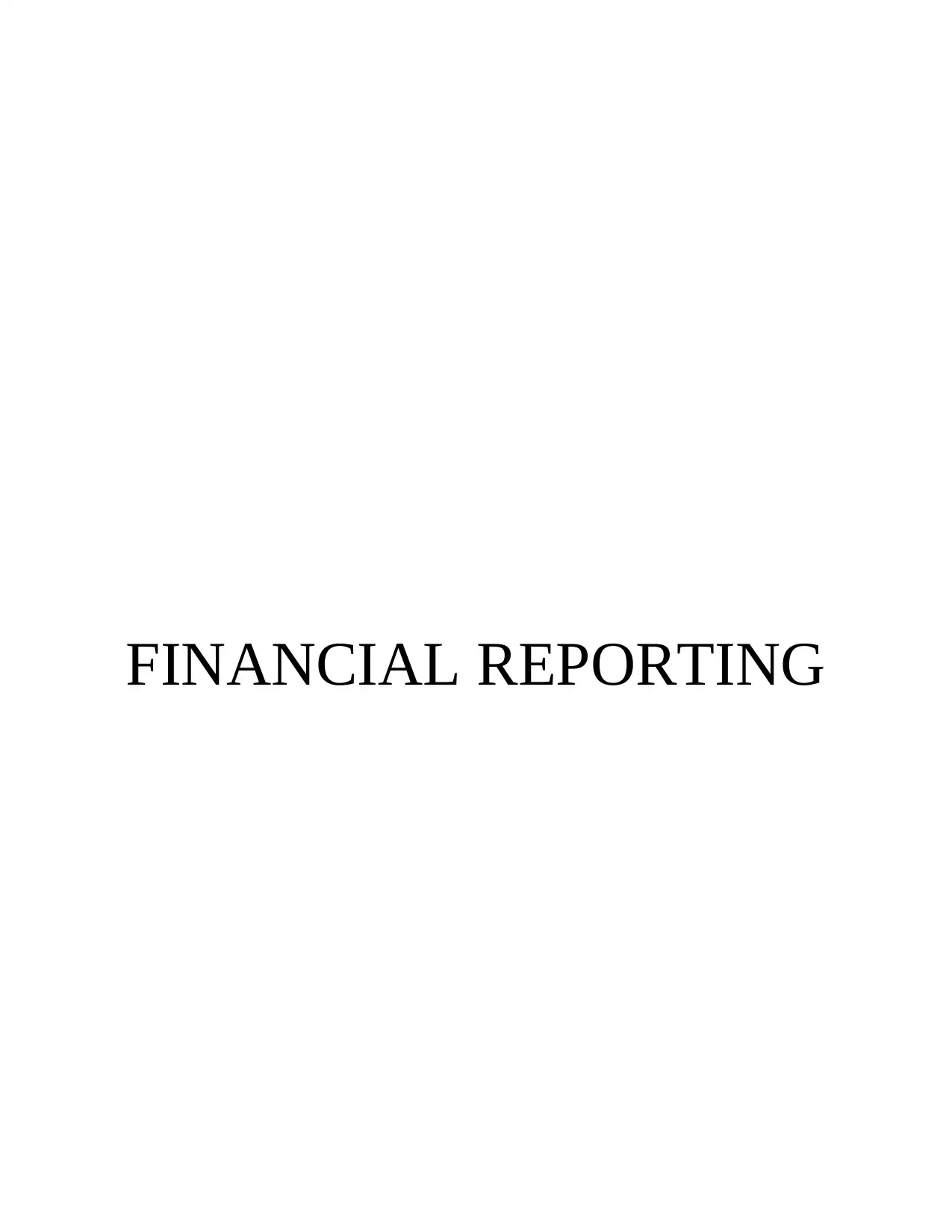
FINANCIAL REPORTING
Paraphrase This Document
Need a fresh take? Get an instant paraphrase of this document with our AI Paraphraser
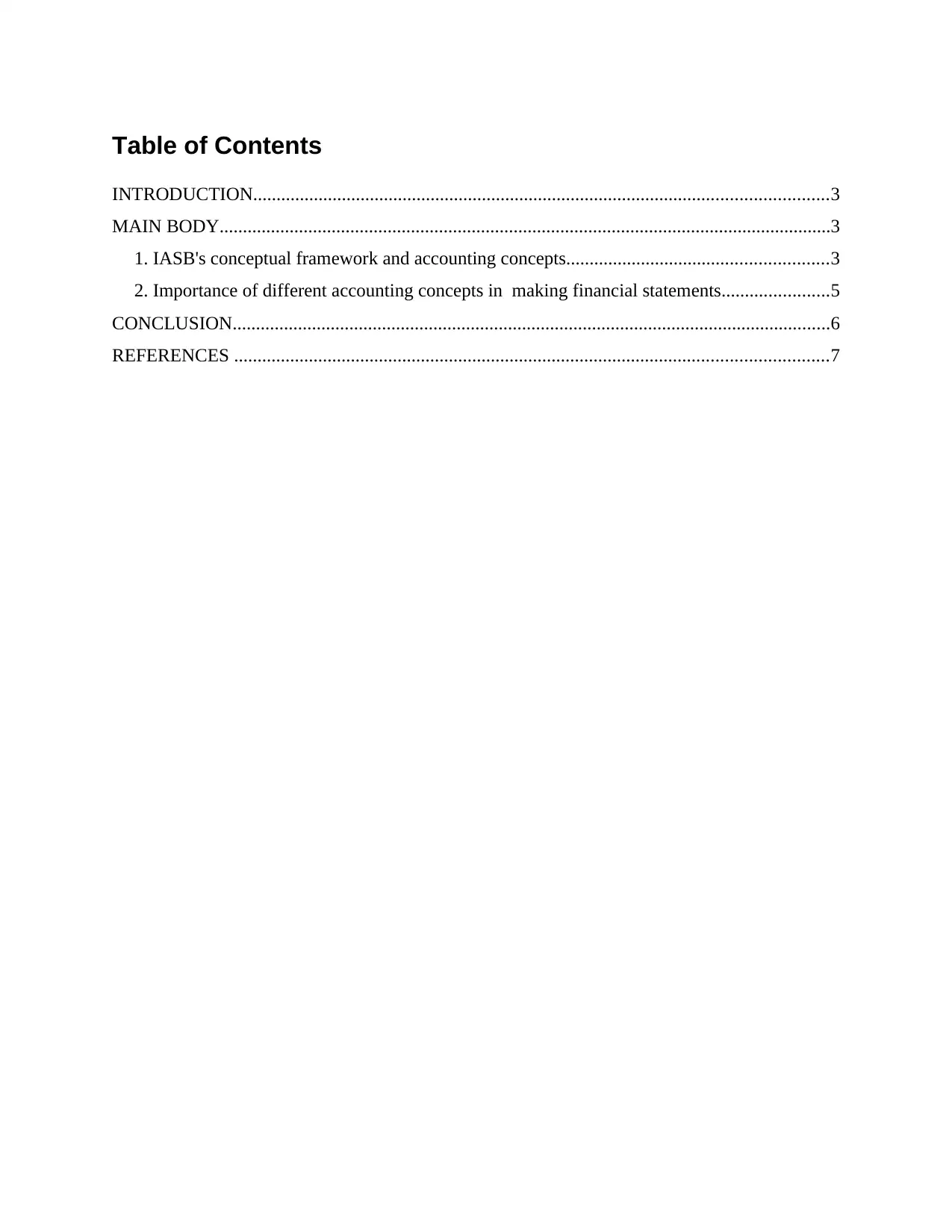
Table of Contents
INTRODUCTION...........................................................................................................................3
MAIN BODY...................................................................................................................................3
1. IASB's conceptual framework and accounting concepts........................................................3
2. Importance of different accounting concepts in making financial statements.......................5
CONCLUSION................................................................................................................................6
REFERENCES ...............................................................................................................................7
INTRODUCTION...........................................................................................................................3
MAIN BODY...................................................................................................................................3
1. IASB's conceptual framework and accounting concepts........................................................3
2. Importance of different accounting concepts in making financial statements.......................5
CONCLUSION................................................................................................................................6
REFERENCES ...............................................................................................................................7
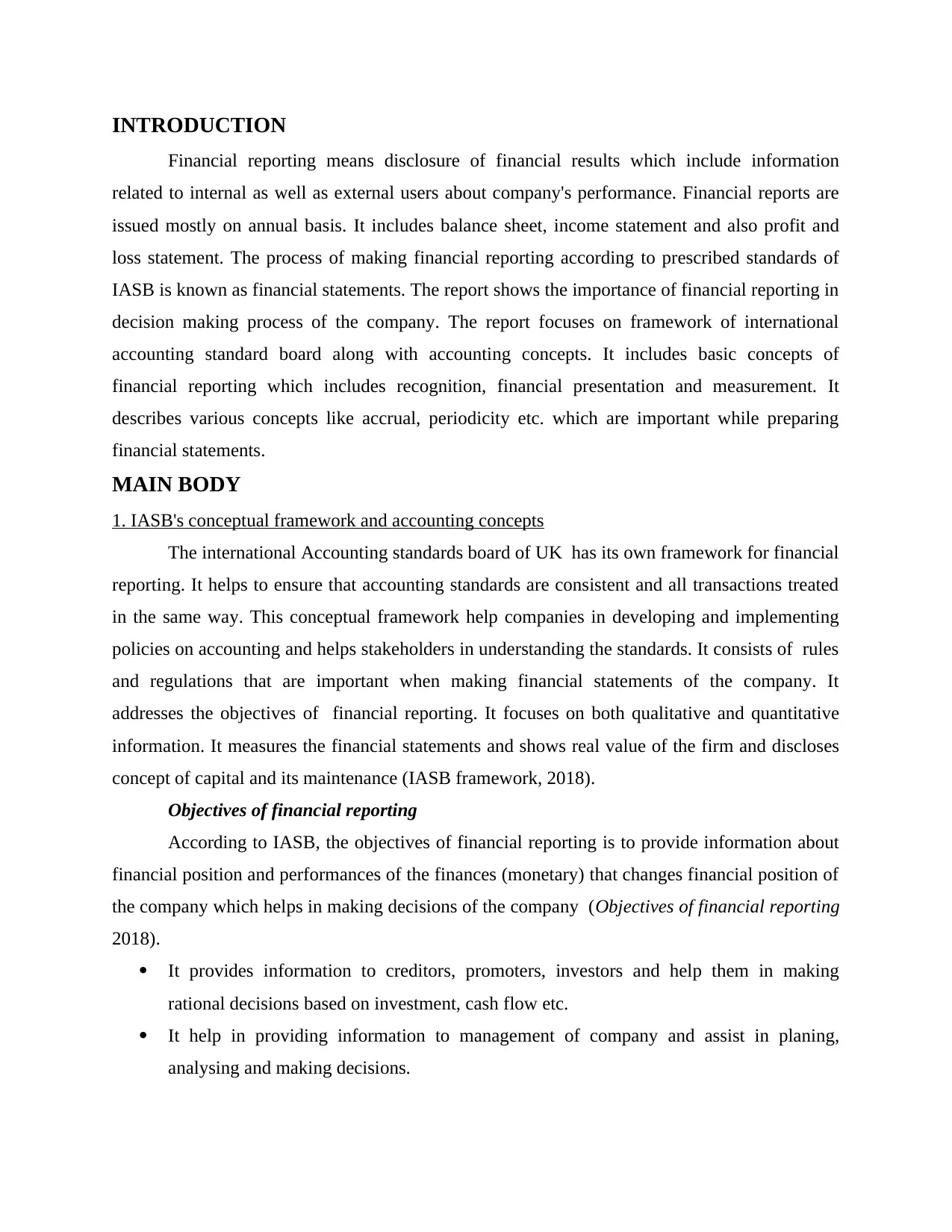
INTRODUCTION
Financial reporting means disclosure of financial results which include information
related to internal as well as external users about company's performance. Financial reports are
issued mostly on annual basis. It includes balance sheet, income statement and also profit and
loss statement. The process of making financial reporting according to prescribed standards of
IASB is known as financial statements. The report shows the importance of financial reporting in
decision making process of the company. The report focuses on framework of international
accounting standard board along with accounting concepts. It includes basic concepts of
financial reporting which includes recognition, financial presentation and measurement. It
describes various concepts like accrual, periodicity etc. which are important while preparing
financial statements.
MAIN BODY
1. IASB's conceptual framework and accounting concepts
The international Accounting standards board of UK has its own framework for financial
reporting. It helps to ensure that accounting standards are consistent and all transactions treated
in the same way. This conceptual framework help companies in developing and implementing
policies on accounting and helps stakeholders in understanding the standards. It consists of rules
and regulations that are important when making financial statements of the company. It
addresses the objectives of financial reporting. It focuses on both qualitative and quantitative
information. It measures the financial statements and shows real value of the firm and discloses
concept of capital and its maintenance (IASB framework, 2018).
Objectives of financial reporting
According to IASB, the objectives of financial reporting is to provide information about
financial position and performances of the finances (monetary) that changes financial position of
the company which helps in making decisions of the company (Objectives of financial reporting
2018).
It provides information to creditors, promoters, investors and help them in making
rational decisions based on investment, cash flow etc.
It help in providing information to management of company and assist in planing,
analysing and making decisions.
Financial reporting means disclosure of financial results which include information
related to internal as well as external users about company's performance. Financial reports are
issued mostly on annual basis. It includes balance sheet, income statement and also profit and
loss statement. The process of making financial reporting according to prescribed standards of
IASB is known as financial statements. The report shows the importance of financial reporting in
decision making process of the company. The report focuses on framework of international
accounting standard board along with accounting concepts. It includes basic concepts of
financial reporting which includes recognition, financial presentation and measurement. It
describes various concepts like accrual, periodicity etc. which are important while preparing
financial statements.
MAIN BODY
1. IASB's conceptual framework and accounting concepts
The international Accounting standards board of UK has its own framework for financial
reporting. It helps to ensure that accounting standards are consistent and all transactions treated
in the same way. This conceptual framework help companies in developing and implementing
policies on accounting and helps stakeholders in understanding the standards. It consists of rules
and regulations that are important when making financial statements of the company. It
addresses the objectives of financial reporting. It focuses on both qualitative and quantitative
information. It measures the financial statements and shows real value of the firm and discloses
concept of capital and its maintenance (IASB framework, 2018).
Objectives of financial reporting
According to IASB, the objectives of financial reporting is to provide information about
financial position and performances of the finances (monetary) that changes financial position of
the company which helps in making decisions of the company (Objectives of financial reporting
2018).
It provides information to creditors, promoters, investors and help them in making
rational decisions based on investment, cash flow etc.
It help in providing information to management of company and assist in planing,
analysing and making decisions.
⊘ This is a preview!⊘
Do you want full access?
Subscribe today to unlock all pages.

Trusted by 1+ million students worldwide
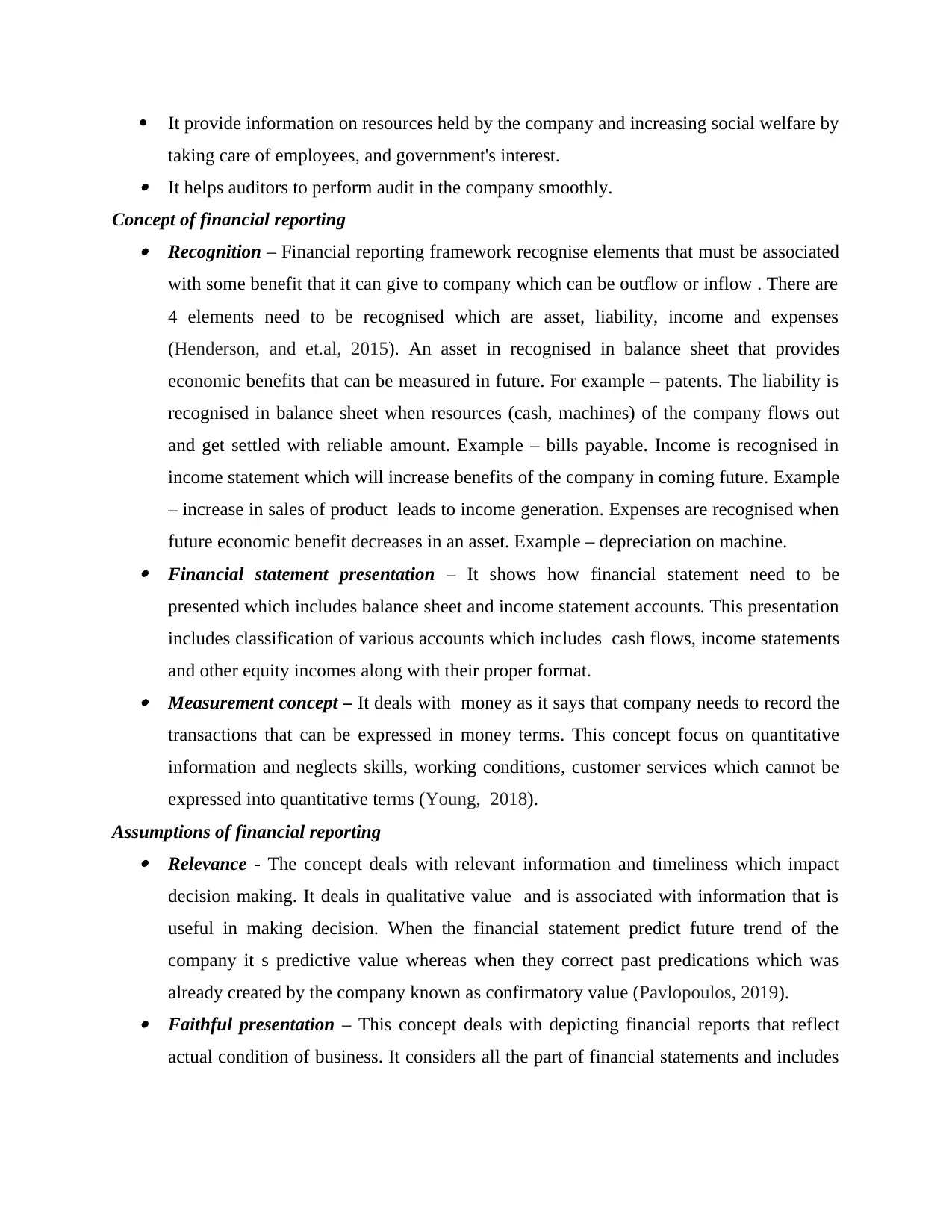
It provide information on resources held by the company and increasing social welfare by
taking care of employees, and government's interest. It helps auditors to perform audit in the company smoothly.
Concept of financial reporting Recognition – Financial reporting framework recognise elements that must be associated
with some benefit that it can give to company which can be outflow or inflow . There are
4 elements need to be recognised which are asset, liability, income and expenses
(Henderson, and et.al, 2015). An asset in recognised in balance sheet that provides
economic benefits that can be measured in future. For example – patents. The liability is
recognised in balance sheet when resources (cash, machines) of the company flows out
and get settled with reliable amount. Example – bills payable. Income is recognised in
income statement which will increase benefits of the company in coming future. Example
– increase in sales of product leads to income generation. Expenses are recognised when
future economic benefit decreases in an asset. Example – depreciation on machine. Financial statement presentation – It shows how financial statement need to be
presented which includes balance sheet and income statement accounts. This presentation
includes classification of various accounts which includes cash flows, income statements
and other equity incomes along with their proper format. Measurement concept – It deals with money as it says that company needs to record the
transactions that can be expressed in money terms. This concept focus on quantitative
information and neglects skills, working conditions, customer services which cannot be
expressed into quantitative terms (Young, 2018).
Assumptions of financial reporting Relevance - The concept deals with relevant information and timeliness which impact
decision making. It deals in qualitative value and is associated with information that is
useful in making decision. When the financial statement predict future trend of the
company it s predictive value whereas when they correct past predications which was
already created by the company known as confirmatory value (Pavlopoulos, 2019). Faithful presentation – This concept deals with depicting financial reports that reflect
actual condition of business. It considers all the part of financial statements and includes
taking care of employees, and government's interest. It helps auditors to perform audit in the company smoothly.
Concept of financial reporting Recognition – Financial reporting framework recognise elements that must be associated
with some benefit that it can give to company which can be outflow or inflow . There are
4 elements need to be recognised which are asset, liability, income and expenses
(Henderson, and et.al, 2015). An asset in recognised in balance sheet that provides
economic benefits that can be measured in future. For example – patents. The liability is
recognised in balance sheet when resources (cash, machines) of the company flows out
and get settled with reliable amount. Example – bills payable. Income is recognised in
income statement which will increase benefits of the company in coming future. Example
– increase in sales of product leads to income generation. Expenses are recognised when
future economic benefit decreases in an asset. Example – depreciation on machine. Financial statement presentation – It shows how financial statement need to be
presented which includes balance sheet and income statement accounts. This presentation
includes classification of various accounts which includes cash flows, income statements
and other equity incomes along with their proper format. Measurement concept – It deals with money as it says that company needs to record the
transactions that can be expressed in money terms. This concept focus on quantitative
information and neglects skills, working conditions, customer services which cannot be
expressed into quantitative terms (Young, 2018).
Assumptions of financial reporting Relevance - The concept deals with relevant information and timeliness which impact
decision making. It deals in qualitative value and is associated with information that is
useful in making decision. When the financial statement predict future trend of the
company it s predictive value whereas when they correct past predications which was
already created by the company known as confirmatory value (Pavlopoulos, 2019). Faithful presentation – This concept deals with depicting financial reports that reflect
actual condition of business. It considers all the part of financial statements and includes
Paraphrase This Document
Need a fresh take? Get an instant paraphrase of this document with our AI Paraphraser
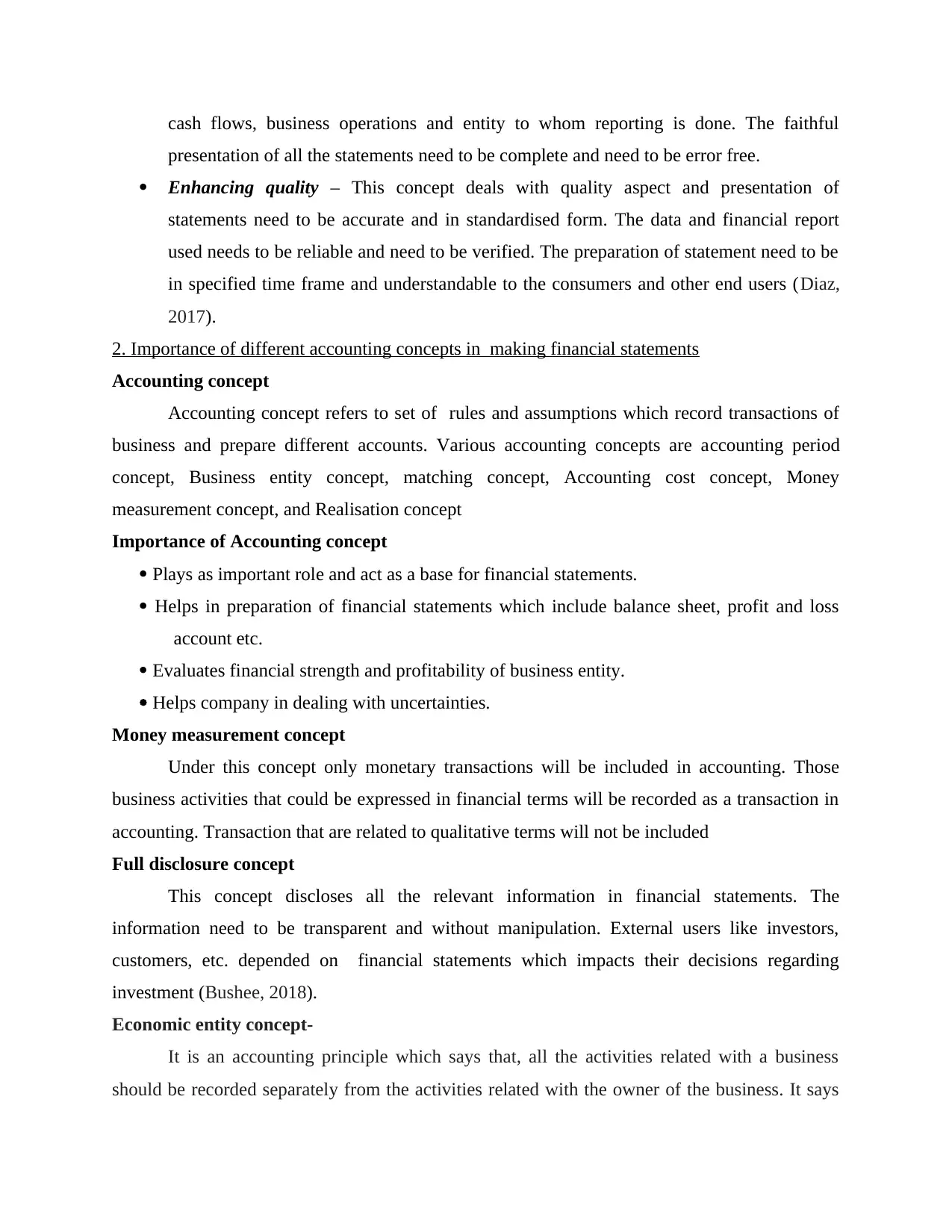
cash flows, business operations and entity to whom reporting is done. The faithful
presentation of all the statements need to be complete and need to be error free.
Enhancing quality – This concept deals with quality aspect and presentation of
statements need to be accurate and in standardised form. The data and financial report
used needs to be reliable and need to be verified. The preparation of statement need to be
in specified time frame and understandable to the consumers and other end users (Diaz,
2017).
2. Importance of different accounting concepts in making financial statements
Accounting concept
Accounting concept refers to set of rules and assumptions which record transactions of
business and prepare different accounts. Various accounting concepts are accounting period
concept, Business entity concept, matching concept, Accounting cost concept, Money
measurement concept, and Realisation concept
Importance of Accounting concept
Plays as important role and act as a base for financial statements.
Helps in preparation of financial statements which include balance sheet, profit and loss
account etc.
Evaluates financial strength and profitability of business entity.
Helps company in dealing with uncertainties.
Money measurement concept
Under this concept only monetary transactions will be included in accounting. Those
business activities that could be expressed in financial terms will be recorded as a transaction in
accounting. Transaction that are related to qualitative terms will not be included
Full disclosure concept
This concept discloses all the relevant information in financial statements. The
information need to be transparent and without manipulation. External users like investors,
customers, etc. depended on financial statements which impacts their decisions regarding
investment (Bushee, 2018).
Economic entity concept-
It is an accounting principle which says that, all the activities related with a business
should be recorded separately from the activities related with the owner of the business. It says
presentation of all the statements need to be complete and need to be error free.
Enhancing quality – This concept deals with quality aspect and presentation of
statements need to be accurate and in standardised form. The data and financial report
used needs to be reliable and need to be verified. The preparation of statement need to be
in specified time frame and understandable to the consumers and other end users (Diaz,
2017).
2. Importance of different accounting concepts in making financial statements
Accounting concept
Accounting concept refers to set of rules and assumptions which record transactions of
business and prepare different accounts. Various accounting concepts are accounting period
concept, Business entity concept, matching concept, Accounting cost concept, Money
measurement concept, and Realisation concept
Importance of Accounting concept
Plays as important role and act as a base for financial statements.
Helps in preparation of financial statements which include balance sheet, profit and loss
account etc.
Evaluates financial strength and profitability of business entity.
Helps company in dealing with uncertainties.
Money measurement concept
Under this concept only monetary transactions will be included in accounting. Those
business activities that could be expressed in financial terms will be recorded as a transaction in
accounting. Transaction that are related to qualitative terms will not be included
Full disclosure concept
This concept discloses all the relevant information in financial statements. The
information need to be transparent and without manipulation. External users like investors,
customers, etc. depended on financial statements which impacts their decisions regarding
investment (Bushee, 2018).
Economic entity concept-
It is an accounting principle which says that, all the activities related with a business
should be recorded separately from the activities related with the owner of the business. It says
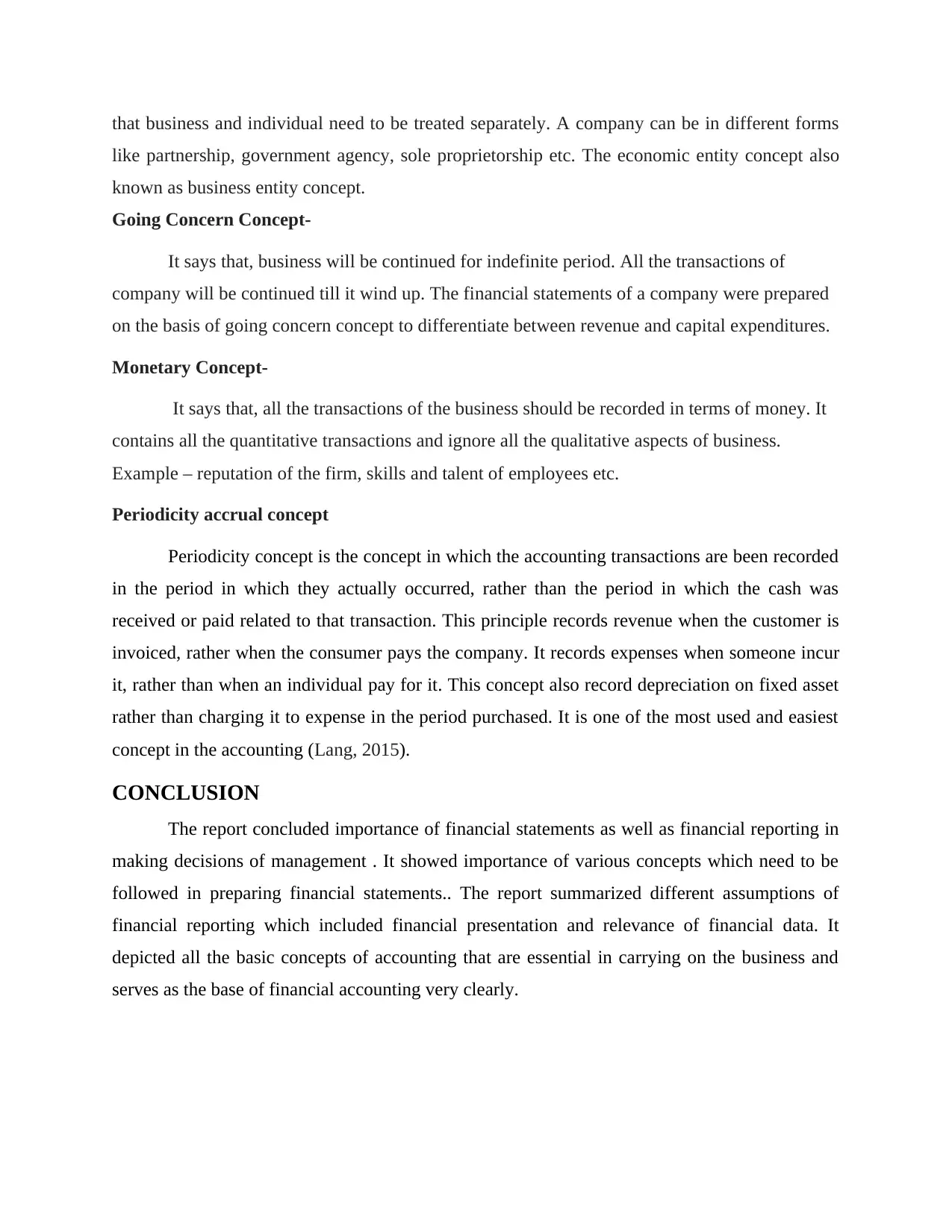
that business and individual need to be treated separately. A company can be in different forms
like partnership, government agency, sole proprietorship etc. The economic entity concept also
known as business entity concept.
Going Concern Concept-
It says that, business will be continued for indefinite period. All the transactions of
company will be continued till it wind up. The financial statements of a company were prepared
on the basis of going concern concept to differentiate between revenue and capital expenditures.
Monetary Concept-
It says that, all the transactions of the business should be recorded in terms of money. It
contains all the quantitative transactions and ignore all the qualitative aspects of business.
Example – reputation of the firm, skills and talent of employees etc.
Periodicity accrual concept
Periodicity concept is the concept in which the accounting transactions are been recorded
in the period in which they actually occurred, rather than the period in which the cash was
received or paid related to that transaction. This principle records revenue when the customer is
invoiced, rather when the consumer pays the company. It records expenses when someone incur
it, rather than when an individual pay for it. This concept also record depreciation on fixed asset
rather than charging it to expense in the period purchased. It is one of the most used and easiest
concept in the accounting (Lang, 2015).
CONCLUSION
The report concluded importance of financial statements as well as financial reporting in
making decisions of management . It showed importance of various concepts which need to be
followed in preparing financial statements.. The report summarized different assumptions of
financial reporting which included financial presentation and relevance of financial data. It
depicted all the basic concepts of accounting that are essential in carrying on the business and
serves as the base of financial accounting very clearly.
like partnership, government agency, sole proprietorship etc. The economic entity concept also
known as business entity concept.
Going Concern Concept-
It says that, business will be continued for indefinite period. All the transactions of
company will be continued till it wind up. The financial statements of a company were prepared
on the basis of going concern concept to differentiate between revenue and capital expenditures.
Monetary Concept-
It says that, all the transactions of the business should be recorded in terms of money. It
contains all the quantitative transactions and ignore all the qualitative aspects of business.
Example – reputation of the firm, skills and talent of employees etc.
Periodicity accrual concept
Periodicity concept is the concept in which the accounting transactions are been recorded
in the period in which they actually occurred, rather than the period in which the cash was
received or paid related to that transaction. This principle records revenue when the customer is
invoiced, rather when the consumer pays the company. It records expenses when someone incur
it, rather than when an individual pay for it. This concept also record depreciation on fixed asset
rather than charging it to expense in the period purchased. It is one of the most used and easiest
concept in the accounting (Lang, 2015).
CONCLUSION
The report concluded importance of financial statements as well as financial reporting in
making decisions of management . It showed importance of various concepts which need to be
followed in preparing financial statements.. The report summarized different assumptions of
financial reporting which included financial presentation and relevance of financial data. It
depicted all the basic concepts of accounting that are essential in carrying on the business and
serves as the base of financial accounting very clearly.
⊘ This is a preview!⊘
Do you want full access?
Subscribe today to unlock all pages.

Trusted by 1+ million students worldwide
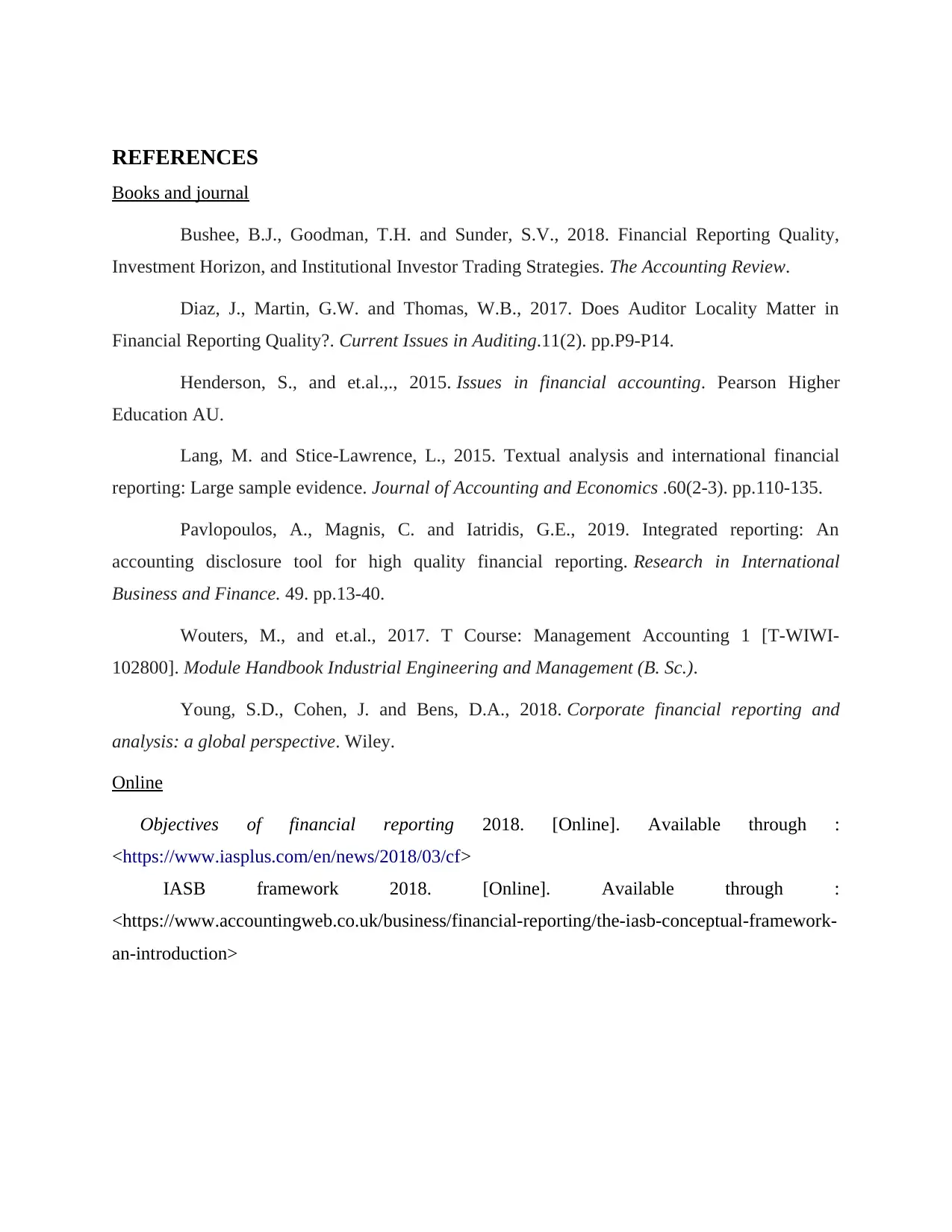
REFERENCES
Books and journal
Bushee, B.J., Goodman, T.H. and Sunder, S.V., 2018. Financial Reporting Quality,
Investment Horizon, and Institutional Investor Trading Strategies. The Accounting Review.
Diaz, J., Martin, G.W. and Thomas, W.B., 2017. Does Auditor Locality Matter in
Financial Reporting Quality?. Current Issues in Auditing.11(2). pp.P9-P14.
Henderson, S., and et.al.,., 2015. Issues in financial accounting. Pearson Higher
Education AU.
Lang, M. and Stice-Lawrence, L., 2015. Textual analysis and international financial
reporting: Large sample evidence. Journal of Accounting and Economics .60(2-3). pp.110-135.
Pavlopoulos, A., Magnis, C. and Iatridis, G.E., 2019. Integrated reporting: An
accounting disclosure tool for high quality financial reporting. Research in International
Business and Finance. 49. pp.13-40.
Wouters, M., and et.al., 2017. T Course: Management Accounting 1 [T-WIWI-
102800]. Module Handbook Industrial Engineering and Management (B. Sc.).
Young, S.D., Cohen, J. and Bens, D.A., 2018. Corporate financial reporting and
analysis: a global perspective. Wiley.
Online
Objectives of financial reporting 2018. [Online]. Available through :
<https://www.iasplus.com/en/news/2018/03/cf>
IASB framework 2018. [Online]. Available through :
<https://www.accountingweb.co.uk/business/financial-reporting/the-iasb-conceptual-framework-
an-introduction>
Books and journal
Bushee, B.J., Goodman, T.H. and Sunder, S.V., 2018. Financial Reporting Quality,
Investment Horizon, and Institutional Investor Trading Strategies. The Accounting Review.
Diaz, J., Martin, G.W. and Thomas, W.B., 2017. Does Auditor Locality Matter in
Financial Reporting Quality?. Current Issues in Auditing.11(2). pp.P9-P14.
Henderson, S., and et.al.,., 2015. Issues in financial accounting. Pearson Higher
Education AU.
Lang, M. and Stice-Lawrence, L., 2015. Textual analysis and international financial
reporting: Large sample evidence. Journal of Accounting and Economics .60(2-3). pp.110-135.
Pavlopoulos, A., Magnis, C. and Iatridis, G.E., 2019. Integrated reporting: An
accounting disclosure tool for high quality financial reporting. Research in International
Business and Finance. 49. pp.13-40.
Wouters, M., and et.al., 2017. T Course: Management Accounting 1 [T-WIWI-
102800]. Module Handbook Industrial Engineering and Management (B. Sc.).
Young, S.D., Cohen, J. and Bens, D.A., 2018. Corporate financial reporting and
analysis: a global perspective. Wiley.
Online
Objectives of financial reporting 2018. [Online]. Available through :
<https://www.iasplus.com/en/news/2018/03/cf>
IASB framework 2018. [Online]. Available through :
<https://www.accountingweb.co.uk/business/financial-reporting/the-iasb-conceptual-framework-
an-introduction>
1 out of 7
Related Documents
Your All-in-One AI-Powered Toolkit for Academic Success.
+13062052269
info@desklib.com
Available 24*7 on WhatsApp / Email
![[object Object]](/_next/static/media/star-bottom.7253800d.svg)
Unlock your academic potential
Copyright © 2020–2026 A2Z Services. All Rights Reserved. Developed and managed by ZUCOL.





